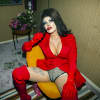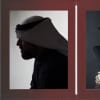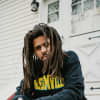Selim Bulut is a music writer who lives in London. He has the most meticulously organized iTunes folder in the land. He’ll be writing about some of the excellent music coming out of the UK every other week.
I’m meeting Louis Carnell, the 23-year-old producer better known as Visionist, in a rather trendy shopping precinct in Brixton, South London. The place is full of cafés, bars and posh burger joints bustling with middle-class couples and high-income families.
Carnell was raised here in Brixton, long before these sorts of gentrified urban cafés had sprung up. At 13, he moved to Nottingham, where he lived for the next five years. He seems to have absorbed a lot from living in these two places – he has the demeanour of someone born in the city, yet the observational perspective of an outsider.
Carnell left London around the time that grime was starting to emerge, and whether it was as a way to reconnect with the city he left behind or something else, he embraced the music in every way he could—he’d produce tracks, he’d spit rhymes with friends and he’d listen to grime when he got home from school.
But when he returned to London for university a few years later, he found few people were interested in the music he was making. Surprisingly, the American audience seemed to be more receptive to grime than its country of origin, and Carnell ended up flying to New York last year where his music might be better accepted. He ended up playing shows in the city and hanging out with the experimental dance community out there, where he met the likes of DJs Rizzla and Total Freedom, footwork DJs Rashad and Manny, as well as US-based grime producers like Rabit. Importantly, he also met J-Cush, head of Lit City Trax, the label who released his I’m Fine EP on September 3rd. J-Cush put him in touch with artist and avant-garde musician Fatima Al Qadiri, and the two found common ground in their styles, and ended up collaborating on EP track “The Call”.
The two of us end up conducting our interview at a spot that sells expensive burritos—it’s the only quiet place we can find in the area. About halfway through our chat, a burrito arrives, which Carnell makes slow progress on eating throughout our conversation. Between giving his opinions of the careers of Dot Rotten and Chipmunk, or outlining his reasons for going to New York (“Why not New York? I’m not gonna go to Australia or anything”), he barely gets a chance to take a bite.
Stream: Visionist and Fatima Al Qadiri, "The Call"
Let’s start with your trip to New York last year. What drove you to go out there? The UK had become very much about ‘”new techno” and “new house,” and that’s not really something that I know that much about. I could see that the US was getting into grime, and I was speaking to a couple of people and they were like, “you should go over, I think people would like your stuff over there.” I hit up a couple of people and showed them my music. J-Cush was one of them, he loves grime—he’s actually British, I don’t know if anyone knows that—and he was my main point of contact. He said “come meet me,” and from there we chilled a lot. I was there for two weeks, and me and him—we just kind of clicked.
It’s cool that you were able to dive straight into another country and integrate with their music community so easily. I felt I needed to go somewhere. It was actually the first time I went abroad out of Europe, and I just went by myself. It was kind of natural, I didn’t have to front it. When I met Fatima [Al Qadiri] we got into conversations, and I’d be like “oh have you heard this artist,” like an old grime artist, and then we get into a conversation.
So, you first started producing when you were living in Nottingham—that means you only started making grime after you left London? Yeah. When I got up there [to Nottingham], there was all of this grime in London. Southside Allstars came out, and my mates down in London were like, “Do you know about this new Southside Allstars shit?” I was like, ooh, South London grime—that’s where I’m from. I completely embraced that stuff—in an internet kind of way, I embraced that stuff—and completely disassociated myself with Nottingham.
So how’d you get into MCing? Literally listening to grime, being with my friends, knowing all the words. They were like, “Why don’t you try and write your own?” And I did. I made tunes with mates, I bought equipment…
When it comes to MCs, you talk about Dot Rotten as a particular influence. What did you like about him? He was pretty real. Just before he became Dot Rotten he did This Is The Beginning [as Young Dot], and that was the first kind of statement of him as an MC. It was pretty deep, and completely South London. And then the beats just became deeper and deeper when he became Dot Rotten. I felt there was some next emotion in his beats, and the vocals were just completely dark. I was really into Dot Rotten, but I was also into Ice Kid—he didn’t do enough stuff. Ice Kid just had some next wordplay. They were the MCs I would just sit down and listen to. We didn’t go out and hear grime in clubs. The only time in Nottingham I’d hear grime would be in a youth club, where we’re all spitting; radio, where we’re all spitting; talent shows… I went to see JME perform once, but again, someone got stabbed afterwards, because Nottingham’s a small place and everyone’s got their little crews. That whole idea of being in a club, going mental to grime—you couldn’t really do that! It became home listening. That’s kind of the way I started producing as well, in a kind of “I wanna make stuff that’s emotional” way. I wanted to make something epic, something that’s saying something meaningful.
What do you think attracted you to the darker side of things? Dunno. Just a frustrated kid maybe? [laughs] That music just agrees with me, I can’t really explain. Life in general is full of ups and downs, and happy music is just [points upwards] up, up, up. It’s all plastic, it’s not real. No one’s just, like, happy, happy, happy. My life, I’ve had friends who are kind of rich, and friends who are pretty broke, and people in Nottingham, I see how they still are, and they’re still completely in their hood. They haven’t managed to escape that, these people who I used to hang around with. I know both sides of the coin; that makes life very balanced. But the whole happy stuff…it’s just not real.
When you started out making music, what did you find appealing about grime? I was completely into that it was UK, that was the main thing for me. It was really UK, and really London, and I was missing London; I was in Nottingham and I was missing London. So it was like, “I can grab on to this.” Grime was new, but everyone embraced it. It’s funny, because a lot of people into old grime won’t embrace new grime, which is kind of a shame. It seems like a lot of producers who made these crazy beats, they didn’t know what they were doing! I think they were just making tunes and it rocked in their heads. The best producers, and even some of the MCs, I see what they’re doing now and they’re telling people “Yeah, I’ve progressed,” and I just think, you must’ve not know what the hell you were doing, because I’m hearing your music and thinking it’s really dumbed down! It doesn’t make sense in my head, it’s weird.
Your music interprets a lot of vocal samples. What do you look for when you’re listening to vocal tracks? I think that I listen to the tone of voice. I get the a cappella and get the bits are a certain tone. It’s more about key, I create a new key for that sound. I use the voice like a piano, then I just flip the songs. If I hear a tone that I know I can put some nice reverb on it and it’ll turn darker, that’s what I look for in samples.
So it’s like finding the darkness in something that might not be intended to be? If you listen to that song and strip away the beat and you can recreate a whole new meaning and take that into the context of how you feel. They’re saying it, but you’re recreating it, so it’s said again but in your own words.
What would you be looking for with vocalists MCs you want to work with? Pretty dark lyricism. Tone of voice. The tone shows whether what they’re singing is real or not. If someone’s talking about a breakup but you don’t feel it, then they’re just saying a bunch of lyrics. It’s the same with my music: I don’t want it to just be a bunch of sounds. I think that’s why this EP has probably hit the widest audience out of anything I’ve done before: people can relate. They know my music’s from a true place.


